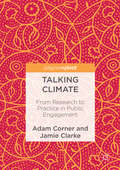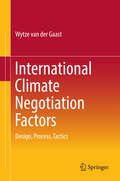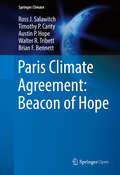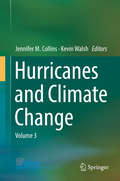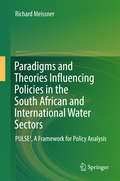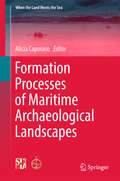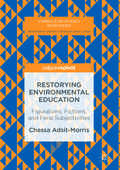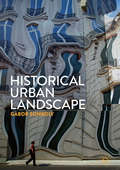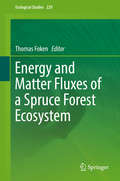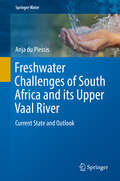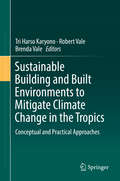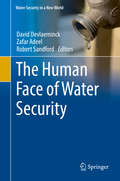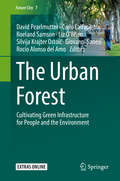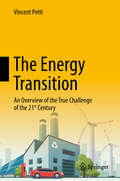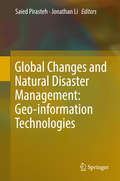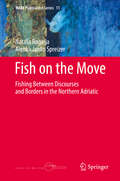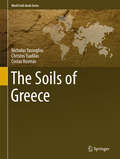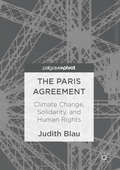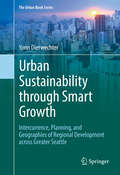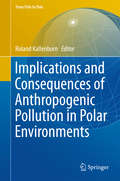- Table View
- List View
Talking Climate
by Adam Corner Jamie ClarkeThis book describes a fresh approach to climate change communication: five core principles for public engagement that can propel climate change discourse out of the margins and into the mainstream. The question of how to communicate about climate change, and build public engagement in high-consuming, carbon-intensive Western nations, has occupied researchers, practitioners, and campaigners for more than two decades. During this time, limited progress has been made. Socially and culturally, climate change remains the preserve of a committed but narrow band of activists. Public engagement is stuck in second gear. By spanning the full width of the space between primary academic research and campaign strategies, this book will be relevant for academics, educators, campaigners, communicators and practitioners.
International Climate Negotiation Factors
by Wytze GaastProviding a detailed examination of climate negotiations records since the 1990s, this book shows that, in addition to agreeing on climate policy frameworks, the negotiations process is of crucial importance to success. Shedding light on the dynamics of international climate policymaking, its respective chapters explore key milestones such as the Kyoto Protocol, Marrakech Accords, Cancun Agreement and Doha Framework. The book identifies a minimum of three conditions that need to be fulfilled for successful climate negotiations: the negotiations need to reflect the fact that climate change calls for global solutions; the negotiation process must be flexible, including multiple trajectories and several small steps; and decisive tactical maneuvers need to be made, as much can depend on, for example, personalities and the negotiating atmosphere. With regard to the design of an international climate policy regime, the main challenge presented has been the inability to agree on globally supported greenhouse gas emission reduction measures. The book offers an excellent source of information for researchers, policymakers and advisors alike.
Paris Climate Agreement: Beacon of Hope
by Ross J. Salawitch Timothy P. Canty Austin P. Hope Walter R. Tribett Brian F. BennettThis book is open access under a CC BY 4. 0 license. This volume presents an Empirical Model of Global Climate developed by the authors and uses that model to show that global warming will likely remain below 2#65533;C, relative to preindustrial, throughout this century provided: a) both the unconditional and conditional Paris INDC commitments are followed; b) the emission reductions needed to achieve the Paris INDCs are carried forward to 2060 and beyond. The first section of the book provides a short overview of Earth's climate system, describing and contrasting climatic changes throughout the planet's history and anthropogenic changes post-Industrial Revolution. The second section describes the climate model developed by the authors (Canty et al. , Atmospheric Chemistry and Physics, 2013) and contrasts the model with climate models used in the Intergovernmental Panel on Climate Change (IPCC) 2013 Report. Chapter 3 examines both the unconditional (i. e. , firm commitments) and conditional Paris INDCs (commitments contingent on financial flow and/or technology transfer) through the lens of their climate model and concludes that if all of the Paris INDCs are followed, then they are indeed a beacon of hope for Earth's climate. The fourth part of the book offers a perspective of energy needs and subsequent emissions reductions required to meet the Paris temperature goals, illuminating challenges faced both in the developing world and the developed world. Throughout the book, easy-to-understand charts and graphics illustrate concepts. The scientific basis of Chapters 2 and 3 was first presented in a keynote session of the 96th Annual Meeting of the American Meteorological Society in January, 2016.
Thoreau's Animals
by Henry David Thoreau Debby Cotter Kaspari Geoff WisnerFrom Thoreau's renowned Journal, a treasury of memorable, funny, and sharply observed accounts of his encounters with the wild and domestic animals of Concord Many of the most vivid writings in the renowned Journal of Henry David Thoreau concern creatures he came upon when rambling the fields, forests, and wetlands of Concord and nearby communities. A keen and thoughtful observer, he wrote frequently about these animals, always sensitive to their mysteries and deeply appreciative of their beauty and individuality. Whether serenading the perch of Walden Pond with his flute, chasing a loon across the water's surface, observing a battle between black and red ants, or engaging in a battle of wits with his family's runaway pig, Thoreau penned his journal entries with the accuracy of a scientist and the deep spirituality of a transcendentalist and mystic. This volume, like its companion Thoreau's Wildflowers, is arranged by the days of the year, following the progress of the turning seasons. A selection of his original sketchbook drawings is included, along with thirty-five exquisite illustrations by naturalist and artist Debby Cotter Kaspari.
Bird Migration Across the Himalayas
by Prins Herbert H. T. Tsewang NamgailBirds migrating across the Himalayan region fly over the highest peaks in the world, facing immense physiological and climatic challenges. The authors show the different strategies used by birds to cope with these challenges. Many wetland avian species are seen in the high-altitude lakes of the Himalayas and the adjoining Tibetan Plateau, such as Bar-Headed Geese. Ringing programmes have generated information about origins and destinations, and this book is the first to present information on the bird's exact migratory paths. Capitalising on knowledge generated through satellite telemetry, the authors describe the migratory routes of a multitude of birds flying over or skirting the Himalayas. The myriad of threats to migratory birds and the wetland system in the Central Asian Flyway are discussed, with ways to mitigate them. This volume will inform and persuade policy-makers and conservation practitioners to take appropriate measures for the long-term survival of this unique migration.
Hurricanes and Climate Change
by Kevin Walsh Jennifer M. CollinsThis book provides research that shows tropical cyclones are more powerful than in the past with the most dramatic increases occurring over the North Atlantic and with the strongest hurricanes. Although such increases are correlated with warming oceans and are consistent with the thermodynamic theory of hurricane intensity, there remains doubt about the interpretation, integrity, and meaning of these results. Arising from the 5th International Summit on Hurricanes and Climate Change, this book contains new research on topics related to hurricanes and climate change. Bringing together international leading academics and researchers on various sides of the debate, the book discusses new research and expresses opinions about what is happening and what might happen in the future with regard to regional and global hurricane (tropical cyclone) activity.
Architecture and the Origins of Preclassic Maya Politics
by James DoyleArchitecture and the Origins of Preclassic Maya Politics highlights the dramatic changes in the relationship of ancient Maya peoples to the landscape and to each other in the Preclassical period (ca. 2000 BC-250 AD). Offering a comprehensive history of Preclassic Maya society, James Doyle focuses on recent discoveries of early writing, mural painting, stone monuments, and evidence of divine kingship that have reshaped our understanding of cultural developments in the first millennium BC. He also addresses one of the crucial concerns of contemporary archaeology: the emergence of political authorities and their subjects in early complex polities. Doyle shows how architectural trends in the Maya Lowlands in the Preclassic period exhibit the widespread cross-cultural link between monumental architecture of imposing intent, human collaboration, and urbanism.
Wildlife Politics
by Bruce RocheleauAttitudes towards charismatic animals such as tigers, lions, bears and wolves vary greatly and change over time, resulting in bitter political debates. This comprehensive book identifies and analyses the factors that influence policies across the globe, highlighting how this impacts conservation as a whole. Issues such as overexploitation, hunting, ecotourism and the struggle to prevent illegal wildlife trafficking are examined and science's role in policymaking is assessed. The conflicting forces behind legislation, including institutions, interest groups and the media are analysed, with particular focus on the significance of the Endangered Species Act, covering over forty-five species that have become matters of political debate in sixty-seven different countries. Case studies and conceptual frameworks provide a clear understanding of the key topics, shedding light on this important yet often overlooked area of environmental politics.
Paradigms and Theories Influencing Policies in the South African and International Water Sectors
by Richard MeissnerThis book presents a new way of looking at and analyzing policies, programs and/or plans in which research scientists have used their knowledge to develop mechanisms such as South Africa's National Water Resource Strategy, Second Edition; Australian and South African climate change adaptation strategies for government entities and the UNDP's Water and Ocean Governance focus area. It critically assesses how science can be used in the service of society and how researchers and practitioners can bridge the gaps that arise as a result of incomplete thinking. Presenting a bird's-eye view of how thinking and understanding operate in the policy context, it offers a valuable contribution to fields of inquiry such as research methods, comparative analyses, political science, international relations and the natural and social sciences in general. This book fills a market gap, providing real-world solutions to the practical application of science, paradigms and theories.
Formation Processes of Maritime Archaeological Landscapes
by Alicia CaporasoResearch into the anthropogenic and taphonomic processes that affect the formation of maritime archaeological resources has grown significantly over the last decade in both theory and the analysis of specific sites and associated material culture. The addition of interdisciplinary inquiry, investigative techniques, and analytical modeling, from fields such as engineering, oceanography, and marine biology have increased our ability to trace the unique pathways through which archaeological sites progress from initial deposition to the present, yet can also link individual sites into an integrated socio-environmental maritime landscape. This edited volume presents a global perspective of current research in maritime archaeological landscape formation processes. In addition to "classically" considered submerged material culture and geography, or those that can be accessed by traditional underwater methodology, case studies include less-often considered sites and landscapes. These landscapes, for example, require archaeologists to use geophysical marine survey equipment to characterize extensive areas of the seafloor or go above the surface to access maritime archaeological resources that have received less scholarly attention.
Restorying Environmental Education
by Chessa Adsit-MorrisThis book examines a performative environmental educational inquiry through a place-based eco-art project collaboratively undertaken with a class of grade 4-6 students around the lost streams of Vancouver. The resulting work explores the contradictions gathered in relation to the Western educational system and the encounter with "Other" (real and imaginary others), including the shifting and growing "self," and an attempt to find and foster nourishing alliances for transforming environmental education. Drawing on the work of new materialist theorists Donna Haraway, Rosi Braidotti, and Karen Barad, Adsit-Morris considers the co-constitutive materiality of human corporeality and nonhuman natures and provides useful tools for finding creative theoretical alternatives to the reductionist, representationalist, and dualistic practices of the Western metaphysics.
Historical Urban Landscape
by Gábor SonkolyThis book uses the Historic Urban Landscape - the most recently codified notion of international urban heritage conservation - to demonstrate why it is necessary to demarcate history from cultural heritage and what consequences the increasing popularity of the latter have on history. It also demonstrates how the history of cultural heritage can be constructed as a historical problem. First, the conceptual history of urban heritage preservation - based on the standard setting instruments of international organizations - reveals the fundamental elements of the current concept of urban heritage. Second, this concept, as worded in the HUL approach, is investigated through the analysis of Vienna, which played a crucial role in the establishment of HUL. These examples are used to to show how the evolution of cultural heritage can be constructed as a historical problem.
Energy and Matter Fluxes of a Spruce Forest Ecosystem
by Thomas FokenThis book focuses on fluxes of energy, carbon dioxide and matter in and above a Central European spruce forest. The transition from a forest affected by acid rain into a heterogeneous forest occurred as a result of wind throw, bark beetles and climate change. Scientific results obtained over the last 20 years at the FLUXNET site DE-Bay (Waldstein-Weidenbrunnen) are shown together with methods developed at the site, including the application of footprint models for data-quality analysis, the coupling between the trunk space and the atmosphere, the importance of the Damk#65533;hler number for trace gas studies, and the turbulent conditions at a forest edge. In addition to the many experimental studies, the book also applies model studies such as higher-order closure models, Large-Eddy Simulations, and runoff models for the catchment and compares them with the experimental data. Moreover, by highlighting processes in the atmosphere it offers insights into the functioning of the ecosystem as a whole. It is of interest to ecologists, micrometeorologists and ecosystem modelers.
Freshwater Challenges of South Africa and its Upper Vaal River
by Anja Du PlessisThis book promotes better understanding and awareness of South Africa' significant water problems by describing the country's and especially the Vaal River's water resources. It is a "go-to" book for students, professionals and regular citizens when information is required regarding the country's and more specifically the Vaal River's freshwater resources. It highlights the major problems and risks which need to be addressed and give a realistic and true representation of the current water affairs.
Sustainable Building and Built Environments to Mitigate Climate Change in the Tropics
by Tri Harso Karyono Robert Vale Brenda ValeThis book offers a selection of the best papers presented during the International conference on Mitigating and Adapting Built Environments for Climate Change in the Tropics, held at Tanri Abeng University (TAU), Jakarta, Indonesia, March 2015. The book is divided into four main parts. The first part deals with the general issue of climate change, the cause and the ways to mitigate and to adapt the built environment for climate change in a number of countries. Part 2 deals with the conceptual ways to mitigate building for climate change. The ways to reduce cooling energy in tropical buildings by means of passive design. Part 3 offers papers that examine the way to overcome disasters in the city caused by climate change. The final part deals with the role of plants in mitigating and adapting built environments to climate change - the use of plants, trees and bushes to directly and indirectly reduce carbon emissions are discussed.
Sightings: The Gray Whales' Mysterious Journey
by Linda Hogan Brenda PetersonTraces the lives of gray whales during their migrations between Alaska and Mexico, from their summer feeding grounds in the Bering Sea to winter birthing lagoons in Baja, examining their rich history including the conflict between their hunters and environmental protectors.
The Human Face of Water Security
by Zafar Adeel David Devlaeminck Robert SandfordThis volume collects essays from academics and practitioners from a diversity of areas and perspectives in order to discuss water security at various levels and to illuminate the central idea of water security: its focus on the individual. Beginning with the big picture, this book aims to illustrate the depth of the water security crisis and its interconnections with other aspects of societal development. It particularly draws a connection to the 2030 Agenda for Sustainable Development, and discusses that challenges faced in meeting the 17 sustainability development goals (SDG) by the year 2030. Moving from international to domestic and community perspectives, this book provides a unique analysis of issues and solutions to the water issues we face today in light of the ever looming global changes brought on by climate change. Over the past few decades the recognition of our common need for water has increased, as policymakers have sought to place more focus on the individual within policy. After the recognition of water and sanitation as a fundamental human right by the United Nations General Assembly in 2010, there is increasing recognition of the individual as the building block for the struggle for water security. This reality also intersects with adverse impacts of global climate change, and the book responds to the broader question: will clean and safe water be available where we need it and when we need it in the future?
The Urban Forest
by Liz O'Brien David Pearlmutter Carlo Calfapietra Roeland Samson Silvija Krajter Ostoić Giovanni Sanesi Rocío Alonso del AmoThis book focuses on urban "green infrastructure" - the interconnected web of vegetated spaces like street trees, parks and peri-urban forests that provide essential ecosystem services in cities. The green infrastructure approach embodies the idea that these services, such as storm-water runoff control, pollutant filtration and amenities for outdoor recreation, are just as vital for a modern city as those provided by any other type of infrastructure. Ensuring that these ecosystem services are indeed delivered in an equitable and sustainable way requires knowledge of the physical attributes of trees and urban green spaces, tools for coping with the complex social and cultural dynamics, and an understanding of how these factors can be integrated in better governance practices. By conveying the findings and recommendations of COST Action FP1204 GreenInUrbs, this volume summarizes the collaborative efforts of researchers and practitioners from across Europe to address these challenges.
The Energy Transition
by Vincent PetitAgainst the backdrop of rapid advances in the energy sector, this book provides a concise overview of the complex challenges in the energy paradigm today, which revolve around the seemingly unsolvable energy equation. The author, an experienced energy professional, combines the various aspects of the energy transition into a single perspective. While highlighting a number of salient problems, he also explores grounds for optimism that these challenges can and will be met. After establishing the historical context, the book presents an analysis of today's energy industry, different energy sources, countries and determinants of energy demand, supplementing all sections with a wealth of global and local data. It subsequently proposes measures to solve the energy equation and a roadmap for a sustainable future, based on more efficient energy use, cleaner energy production and advanced technologies.
Global Changes and Natural Disaster Management: Geo-information Technologies
by Jonathan Li Saied PirastehThis book presents ongoing research and ideas related to earth observations and global change, natural hazards and disaster management studies, with respect to geospatial information technology, remote sensing, and global navigation satellite systems. Readers will discover uses of advanced geospatial tools, spatiotemporal models, and earth observation systems. Chapters identify the international aspects of the coupled social, land and climate systems in global change studies, and consider such global challenges as agriculture monitoring, the smart city, and risk assessment. The work presented here has been carefully selected, edited, and peer reviewed in order to advance research and development, as well as to encourage innovative applications of Geomatics technologies in global change studies. The book will appeal not only to academicians, but also to professionals, politicians and decision makers who wish to learn from the very latest and most innovative, quality research in this area of global change and natural disaster management. Contributions are drawn from revised submissions based on state-of-the-art papers from the 7th GiT4NDM - 5th EOGC, 2015 event.
Fish on the Move
by Nataša Rogelja Alenka Janko SpreizerThis book analyses the relation between different discourses and actors through an ethnographic approach, showing not only how fishermen in Slovenia respond to international political economy, how they struggle to survive but also how they generate small changes. Fishing in the northeastern part of the Adriatic Sea makes for a substantial economy anchored in many stories. Regional conflicts, wars, the demise of empires and the rise of nation states with ensuing maritime border issues, socialist heritage, transnational and transformational processes in Europe, and the growth of capitalist relations between production and consumption in coastal areas, have all contributed to the specific discourses that have affected this relatively under-researched area. How this complex, layered and ambiguous quarrelling is constituted at different levels and how this situation is lived and experienced by the local fishermen working along the present Slovene coast effectively forms the core of this book.
The Soils of Greece
by Nicholas Yassoglou Christos Tsadilas Costas KosmasThis book presents a comprehensive and up-to-date overview on soils of Greece. It includes sections on soil research history, climate, geology, geomorphology, major soil types, soil maps, soil properties, soil classification, soil fertility, land use and vegetation, soil management, soils and humans, soils and industry, future soil issues. The book summarizes what is known about the soils in Greece in a concise and highly reader-friendly way.
The Paris Agreement
by Judith BlauThis book discusses the immediate and severe threat posed by global climate change and the various obstacles that stand in the way of action. Judith Blau presents scientific evidence relevant to The Paris Agreement (COP-21): an international treaty that promises to strengthen the global response to climate change. As she reckons with the dangers of catastrophic planetary heating, Blau discusses the clash between the deeply ingrained American tradition of individualism and the collective action and acknowledgement of intertwined fate needed to address climate change. She acknowledges that America's capitalist bent stands in contrast to the idea of the "commons"--a concept that we need to embrace if climate change is to be mitigated. The volume also explains the foundations of international human rights standards as they relate to climate change. Drawing from guiding principles of human rights and equality, the book concludes hopefully--suggesting that the people of the world can meet the challenge posed by climate change by at once acknowledging shared humanity and celebrating difference.
Urban Sustainability through Smart Growth
by Yonn DierwechterThis book investigates the new urban geographies of "smart" metropolitan regionalism across the Greater Seattle area and examines the relationship between smart growth planning strategies and spaces of work, home, and mobility. The book specifically explores Seattle within the wider space-economy and multi-scaled policy regime of the Puget Sound region as a whole, 'jumping up' from questions of city politics to concerns with what the book interprets as the "intercurrence" of city-regional "ordering. " These theoretical terms capture the state-progressive effort to promote smarter forms of regional development but also the societal/institutional tensions and outright contradictions that such urban development invariably entails, particularly around problems of social equity. Key organizing themes in the text include: the historical path-dependencies of uneven economic and social development, particularly between Tacoma-Pierce County and Seattle-King County; current patterns of high-wage, medium-wage, and low-wage jobs; the emerging spatial and social structure of recent residential changes, especially with respect to class and race composition; and, finally, transit trends and new urban spaces associated with policy efforts to mitigate highway congestion and car-dependency. Greater Seattle, then, is mapped as a key US urban region inscribed spatially by the uneven search for a more sustainable order. Historically-sensitive, theoretically-informed and empirically topical, this book is of interest to scholars and students at all levels in regional planning, urban geography, political science, sustainability studies, urban sociology and public policy.
Implications and Consequences of Anthropogenic Pollution in Polar Environments
by Roland KallenbornThe first evidence on the adverse effects of organic pollutants on Arctic ecosystems was provided by international research initiatives more than 30 years ago. Today, the indigenous people of the North are considered to be affected by exposure to persistent organic pollutants (POPs) and metals through their traditional marine food sources. The occurrence of pollutants of emerging concern in remote Polar environments is considered an essential criterion for prioritising this (largely neglected) type of contamination in national, international and global regulation schemes. Initiated during the first international Polar Years (IPY 2007-2009) and continued afterwards, 11 representative initiatives and projects are summarised as chapters in this book, which highlights today's interdisciplinary research on POPs in the Polar environment. The individual chapters describe in detail the consequences, priorities and perspectives of international research on POPs (legacy and emerging xenobiotics), its implications for regulations and scientific priorities including societal and cultural developments in the Arctic, as well as conservation priorities in Antarctica. This book is intended for all readers interested in learning more about modern research on environmental pollutants in the Polar environments (with a strong focus on Arctic environments). The impacts of pollution and climate change on Polar regions and the world as a whole will continue to be felt for many years to come. Sound science is, thus, vital in order to underpin actions that need to be taken at the global, regional and local levels. This book contributes to this highly relevant, interdisciplinary environmental scientific endeavour.
